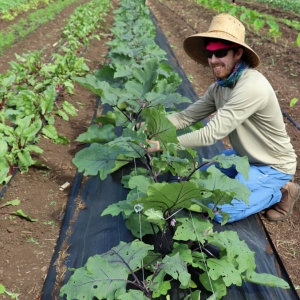
Three University of Hawaiʻi projects have received a total of more than $1.6 million in grants to support food and agricultural science for underrepresented students. The U.S. Department of Agriculture’s National Institute of Food and Agriculture recently announced a total of $3 million in funding for Native Hawaiian-serving and Alaska Native-serving institutions. These are the UH grants with their descriptions:
Hawaii-One-Ag: Developing New Pathways In Agricultural Education and Future Career Growth, $1 million
“The impacts of the COVID-19 pandemic have demonstrated that the State of Hawaiʻi must create a more sustainable agriculture industry to support local food production and a diverse agricultural economy. Hawaii-One-Ag is an eight-member consortium effort to create agricultural education options for students, and pathways for career opportunities and professional growth. Native Hawaiians (NH) are underrepresented in higher education due to access to articulated classes and programs, the perceived workforce demand, and the perceived benefits of an agricultural education. The UH system is well-placed to serve NH and underserved students from across the state (rural to urban) and from a diversity of educational foundations (high school to doctorate), supporting all student situations with advising, mentorships and student resources. The Hawaii-One-Ag consortium will provide a diversity of educational offerings to meet the needs of our community, our colleges and our islands, from K–12 outreach, with special attention to high school students, to undergraduate and graduate degree programs, including specialized certificates of completion for skills training within the UH system. Our programs are aimed at high school students, college students, agricultural workers who want to further develop their professional and technical skills, and job seekers displaced by COVID-19 pursuing employment opportunities in food and agriculture.”
GoFarm Hawaiʻi (GFH): Training New Farmers and Growing Agribusiness In Hawaiʻi, $450,000

“This Integrated Extension and Education project aims to reduce Hawaiʻi’s dependence on imported food, increase food sustainability, develop the local workforce and support the state’s pandemic economic recovery through an affordable program for adult learners to pursue careers and business in food production. GoFarm Hawaiʻi (GFH) prepares students for careers in food, agriculture and natural resource systems through a certificate-based farmer training program, and supports existing farmers through education and business consulting. The project will enhance GFH‘s program and capacity to develop and support Native Hawaiian (NH) and underrepresented (UR) farmers, building on prior success and experience, and integrating industry and participant feedback. The project will elevate the quality of food, agriculture and natural resource education in Hawaiʻi with the latest science-based and business knowledge, using practical implementation and experiential learning so students can apply lessons in the field (production) and as a business (marketing product, business planning). Collaborations with extension experts and community partners will strengthen the quality and capacity of the project. The project supports multiple need areas including enhanced curricula, instructional offerings, faculty development, informal experiential learning, and targeted outreach and engagement to improve science-based agricultural educational literacy and equity for NH, UR and youth populations and train the next generation of Hawaiʻi’s farmers.”
UH West Oʻahu: Undergraduate Pathways Bridging Excellence In Agriculture and Tradition (UP–BEAT), $207,687

“This project identified the need to take immediate steps to diversify Hawaiʻi’s economy, increase production of local foods, and build greater climate change resilience for enhanced food security; it also identified Indigenous knowledge and traditional food ways as key to transitioning the food system towards sustainability, community health and resilience. The proposed Undergraduate Pathways to Bridging Excellence in Agriculture and Tradition (UP–BEAT) project, led by the faculty and staff of the UH West Oʻahu Sustainable Community Foods Systems program, will educate and train a new generation of food, agriculture, natural resource and human science professionals to think across traditional disciplinary and cultural boundaries to engage and address the many contemporary challenges in the agri-food system of Hawaiʻi and beyond. The proposed UP–BEAT project empowers students to understand and integrate Indigenous knowledge with natural and social science content to build a sustainable food system, and it emphasizes problem-based and experiential learning in order to develop food system professionals capable of solving real-world problems and transitioning Hawaiʻi’s food system toward greater ecological sustainability, social equity, human health and climate change resilience.”

